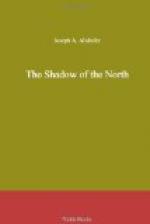“I tell you, Carson,” the young lieutenant was saying in an oratorical manner, “that they magnify the dangers of the wilderness. The ford at which we were to meet Colden is just ahead, and we’ve come straight to it without the slightest mishap. Colden is no sluggard, and he should be here in the morning at the latest. Do you find anything wrong with my reasoning, Hugh?”
“Naught, William,” replied the other, who seemed to be second in command. “Your logic is both precise and beautiful. The dangers of the border are greatly exaggerated, and as soon as we get together a good force all these French and Indians will flee back to Canada. Ah, who is this?”
Both he and his chief turned and faced the woods in astonishment. A youth had stepped forth, and stood in full view. He was taller than either, but younger, dressed completely in deerskin, although superior in cut and quality to that of the ordinary borderer, his complexion fair beneath his tan, and his hair light. He gazed at them steadily with bright blue eyes, and both the first lieutenant and the second lieutenant of the Quaker troop saw that he was no common person.
“Who are you?” repeated William Wilton, who was the first lieutenant.
“Who are you?” repeated Hugh Carson, who was the second lieutenant.
“My name is Robert Lennox,” replied the young stranger in a mellow voice of amazing quality, “and you, I suppose, are Lieutenant William Wilton, the commander of this little troop.”
He spoke directly to the first lieutenant, who replied, impressed as much by the youth’s voice as he was by his appearance:
“Yes, such is my name. But how did you know it? I don’t recall ever having met you before, which doubtless is my loss.”
“I heard it from an associate of yours, your chief in command, Captain James Colden, and I am here with a message from him.”
“And so Colden is coming up? Well, we beat him to the place of meeting. We’ve triumphed with ease over the hardships of the wilderness.” “Yes, you arrived first, but he was delayed by a matter of importance, a problem that had to be solved before he could resume his march.”
“You speak in riddles, sir.”
“Perhaps I do for the present, but I shall soon make full explanations. I wish to call first a friend of mine, an Indian—although you say there are no Indians in the forest—a most excellent friend of ours. Tayoga, come!”
The Onondaga appeared silently in the circle of light, a splendid primeval figure, drawn to the uttermost of his great height, his lofty gaze meeting that of Wilton, half in challenge and half in greeting. Robert had been an impressive figure, but Tayoga, owing to the difference in race, was even more so. The hands of several of the soldiers moved towards their weapons.
“Did I not tell you that he was a friend, a most excellent friend of ours?” said Robert sharply. “Who raises a hand against him raises a hand against me also, and above all raises a hand against our cause. Lieutenant Wilton, this is Tayoga, of the Clan of the Bear, of the nation Onondaga, of the great League of the Hodenosaunee. He is a prince, as much a prince as any in Europe. His mind and his valor have both been expended freely in our service, and they will be expended with equal freedom again.”




